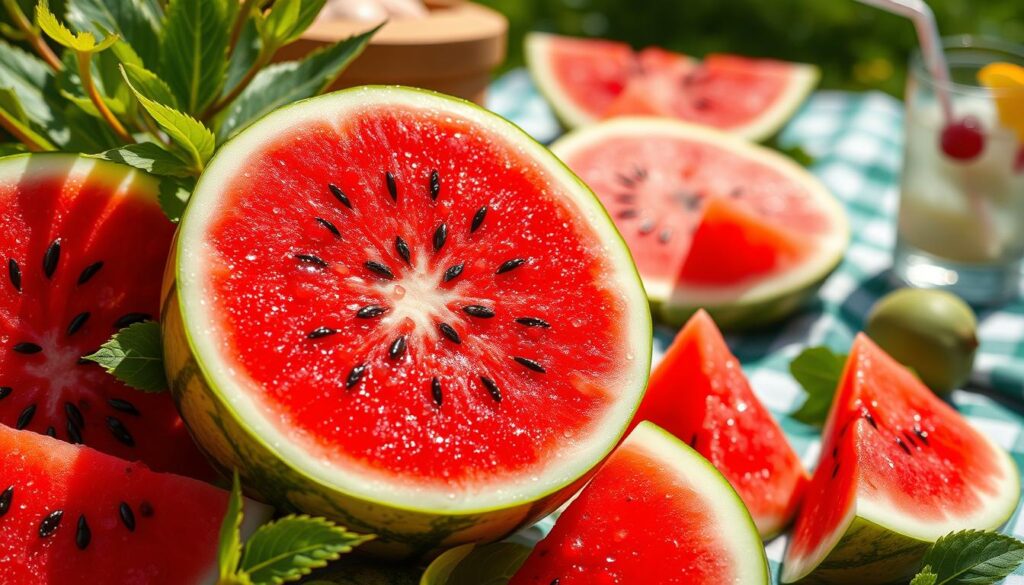Ever thought watermelon might be the best fruit for your health? This vibrant, juicy fruit is more than a summer treat. It’s full of benefits that boost your overall health. From its high water content to its rich nutrients, watermelon is a hydrating powerhouse.
It not only quenches your thirst but also supports your body’s functions. This article will explore watermelon’s advantages and benefits. You’ll see how adding this delicious fruit to your diet can improve your health. It can help with hydration, weight management, and provide essential vitamins.
Key Takeaways
- Watermelon is composed of over 90% water, aiding in hydration.
- It contains vital nutrients like Vitamin C and lycopene that contribute to immune and heart health.
- This low-calorie fruit can support weight management efforts.
- Watermelon helps reduce inflammation, potentially lowering the risk of chronic conditions.
- Consuming watermelon can improve skin health due to its rich vitamins.
- The antioxidants present in watermelon may assist in muscle recovery after exercise.
Introduction to Watermelon
Watermelon, known scientifically as Citrullus lanatus, is a fruit that brings joy to summer gatherings. Its sweet, juicy flesh is a cool treat during hot weather. It’s not just tasty; it’s also packed with health benefits.
Being about 92% water, watermelon is great for staying hydrated. It’s perfect for eating fresh, blending into smoothies, or grilling for a new taste. Each way keeps its nutrients, letting you enjoy its health perks.
Watermelon is not only tasty but also full of vitamins and minerals. A medium slice gives you 9% to 11% of your daily vitamin A. This is good for your eyes. It also has lots of vitamin C to boost your immune system.
Watermelon offers more than just flavor. It has dietary fiber for better digestion and citrulline for better blood flow. This can even help ease muscle soreness.
Watermelon Nutrition Facts
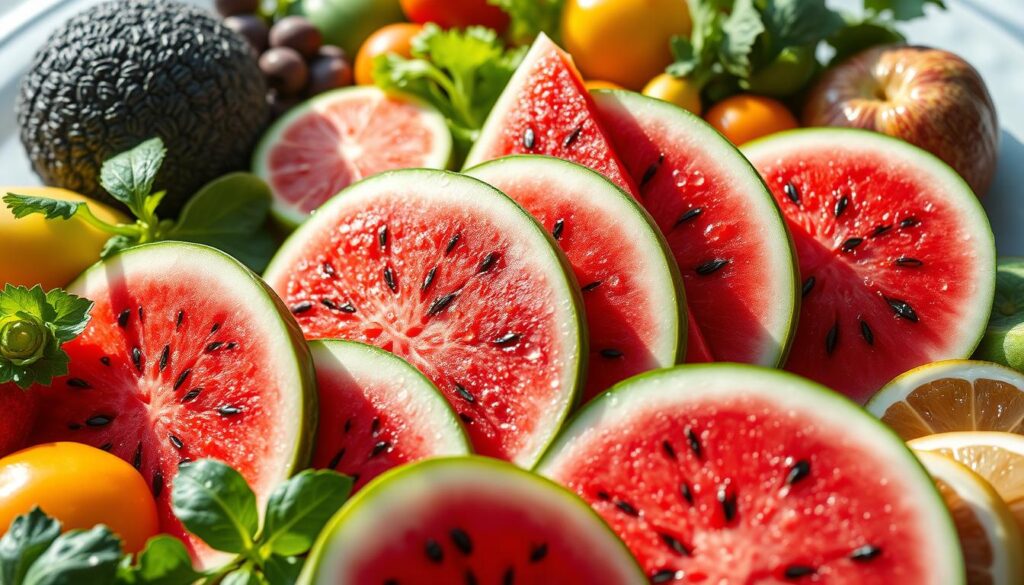
Learning about watermelon nutrition facts helps us see its benefits. It’s full of water and low in calories, making it great for a healthy diet.
Calories and Macronutrients
A serving of watermelon is about one cup, weighing 152 grams. It has around 45.6 calories of watermelon. Watermelon is mostly water, making up 91% of it. Here are its main nutrients:
- Carbohydrates: 11.5 grams
- Natural Sugars: 9.4 grams
- Protein: 0.9 grams
- Fat: 0.2 grams
- Fiber: 0.6 grams
Its low calorie count and balanced nutrients make watermelon perfect for weight management.
Essential Vitamins and Minerals
Watermelon is not just hydrating; it’s also packed with important vitamins and minerals. Key nutrients include:
- Vitamin C: 12.3 mg (25% of the Daily Value)
- Vitamin A: 865 IU (8% of the Daily Value)
- Vitamin B6: 0.1 mg (8% of the Daily Value)
- Potassium: 170 mg (6% of the Daily Value)
- Magnesium: A vital mineral found abundantly in watermelon
Watermelon Health Benefits
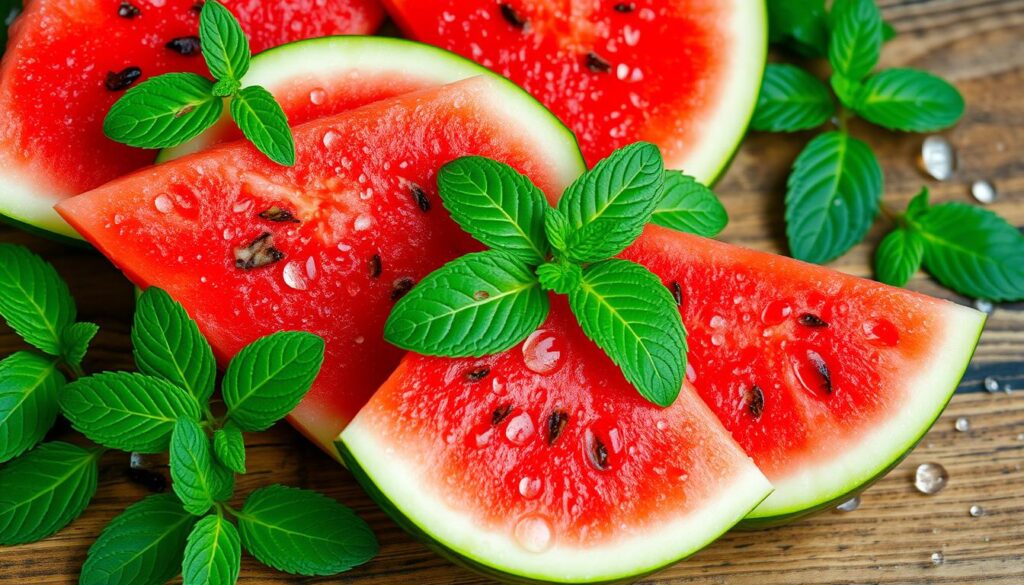
Watermelon is not just tasty but also packed with health benefits. Adding it to your diet can boost your immune system and eye health. It’s a fruit full of nutrients that can help you reach your health goals.
Boosts Immune Health
Watermelon’s high vitamin C content is great for your immune system. Vitamin C helps your body fight off illnesses better. The antioxidants in watermelon also reduce oxidative stress, supporting your immune function.
Regularly eating watermelon can give you better antioxidant protection. This helps you stay healthy all year round.
Supports Eye Health
Vitamins A and C in watermelon are key for eye health. They help keep your vision healthy and protect against age-related macular degeneration. Eating watermelon can help keep your eyes healthy as you get older.
| Health Benefit | Nutrients Involved | Impact on Health |
|---|---|---|
| Immune Boost | Vitamin C, Antioxidants | Improves defense against illness |
| Eye Protection | Vitamin A, Vitamin C | Reduces risk of vision impairment |
Water Content: A Hydration Powerhouse
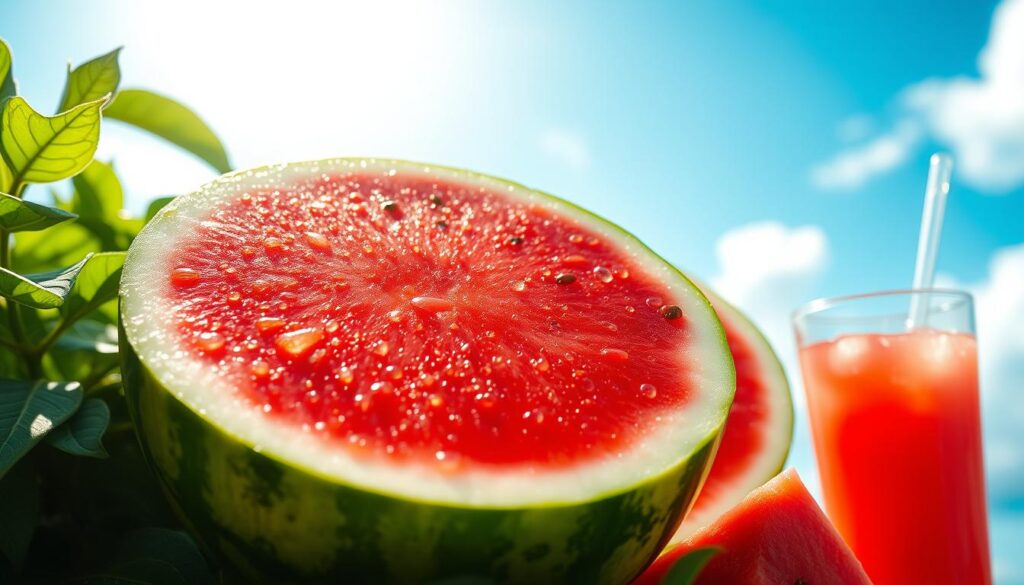
Watermelon is about 92% water by weight. It’s perfect for staying hydrated, even when it’s hot outside. Eating watermelon helps you drink enough water each day. This keeps your body and organs working well.
Watermelon is more than just water. It’s packed with Vitamin C, Vitamin A, potassium, and magnesium. These nutrients help your body function better and improve your health.
Watermelon also has lycopene, an antioxidant that’s good for you. Studies show it can lower cholesterol and blood pressure. It also fights inflammation, which is good for your heart.
Watermelon is also a great snack for those watching their calories. It’s full of natural sugars and water, making it filling. Athletes will like it too because it has citrulline. This amino acid can help with muscle soreness and improve workout performance.
| Benefit | Details |
|---|---|
| Hydration | 92% water content replenishes fluids lost through sweating. |
| Nutrient-Rich | Contains essential vitamins like C and A, and minerals like potassium. |
| Antioxidant Properties | Lycopene and Vitamin C can reduce oxidative stress and inflammation. |
| Weight Management | Natural sugars and high water content provide a low-calorie snack. |
| Athletic Performance | Citrulline may reduce muscle soreness and improve recovery. |
Watermelon Advantages and Benefits
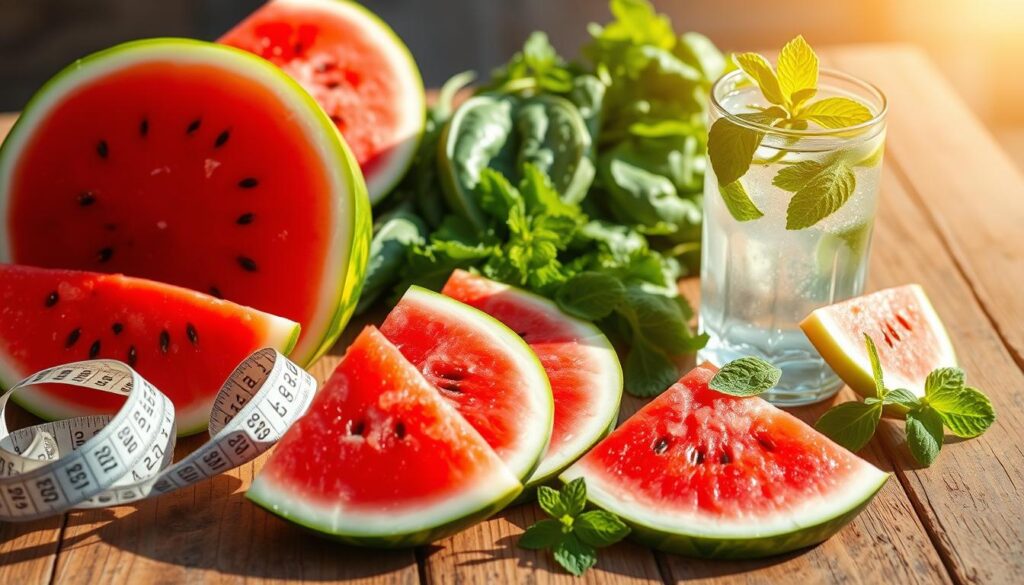
Watermelon is great for your health. It’s low in calories but high in water, helping with weight management. Eating watermelon can satisfy your sweet tooth while helping you lose weight.
Benefits for Weight Management
Watermelon is perfect for those trying to lose weight. It has only about 45.6 kcal per cup, making you feel full without too many calories. By choosing watermelon over high-calorie snacks, you can eat less and lose weight.
Hydrating Effects for Athletes
Athletes will love watermelon’s hydration benefits. It’s mostly water, helping to replace lost fluids during workouts. Watermelon also has potassium and citrulline, which help with exercise performance and reduce muscle soreness.
Key Antioxidants in Watermelon
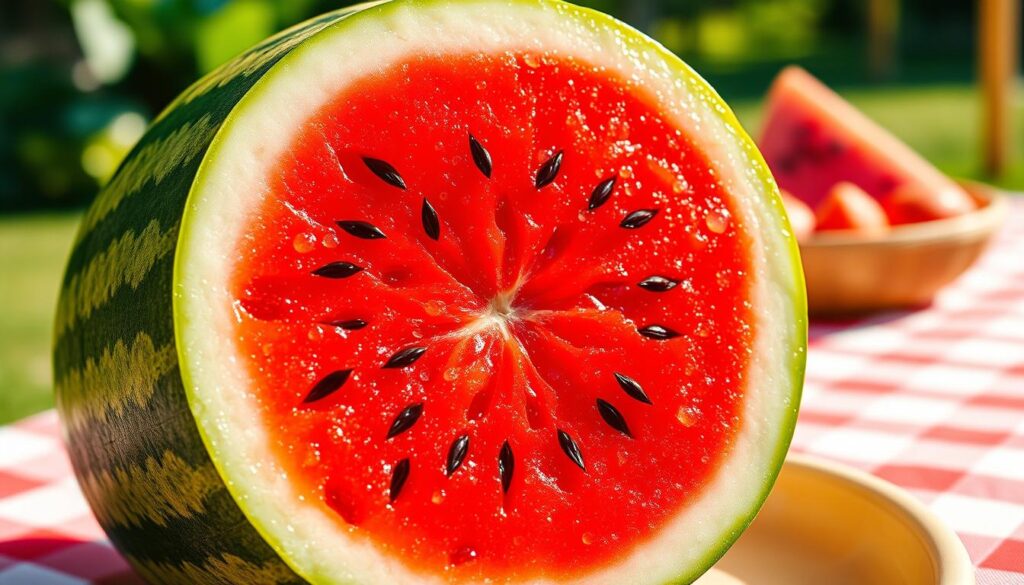
Watermelon is not just refreshing; it’s also full of antioxidants. It has lycopene and vitamin C, which are great for your health. These antioxidants can really boost your well-being.
The Role of Lycopene
Lycopene gives watermelon its bright red color. It’s a strong antioxidant found in watermelon, with 2.30 to 7.20 mg per 100 grams. Red watermelon has even more lycopene than tomatoes, making it a top choice for this antioxidant.
Research shows lycopene may help fight certain cancers and heart disease. That’s why watermelon is called a “Lycopene Leader.”
Vitamin C: More than Just a Nutrient
Vitamin C in watermelon does more than just boost your immune system. A 2-cup serving gives you about 25% of your daily vitamin C needs. It’s key for making collagen, which keeps your skin healthy.
Vitamin C also helps your skin stay elastic and repair itself. Eating watermelon regularly can make your skin look better. It’s a tasty way to improve your skin’s health.
| Nutrient | Amount per 2-cup serving | Daily Value (DV) Percentage |
|---|---|---|
| Lycopene | 12.7 mg | Not established |
| Vitamin C | 25% DV | 25% |
| Vitamin A | 8% DV | 8% |
| Vitamin B6 | 8% DV | 8% |
| Potassium | 6% DV | 6% |
| Water Content | 92% | Not applicable |
Reducing Muscle Soreness and Enhancing Recovery
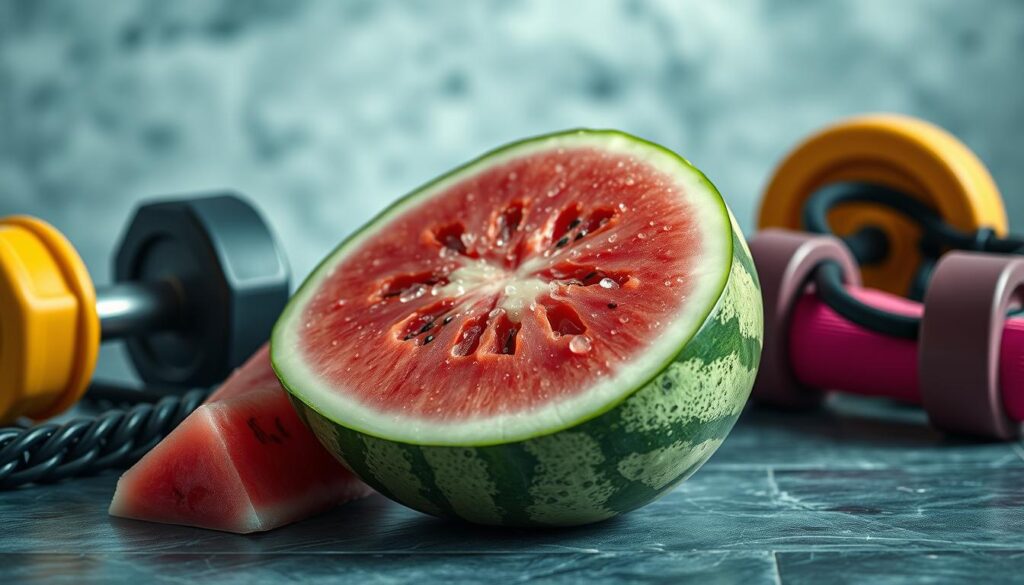
Watermelon is a great choice for helping your body recover after working out. It’s packed with L-citrulline, an amino acid that boosts athletic performance. You can get between 286 to 1,266 milligrams of L-citrulline in two cups of watermelon.
This nutrient is key in reducing muscle soreness. It helps lower heart rates and removes toxins from your body. Studies show that drinking watermelon juice can lessen muscle soreness after hard workouts. A study in the Journal of Agricultural and Food Chemistry found that people felt less sore after drinking it.
- Watermelon juice not only hydrates but also supplies essential nutrients like potassium and magnesium.
- With 269 milligrams of potassium per cup, watermelon juice effectively supports muscle function and fluid balance.
- The juice’s natural sugars also aid in glycogen replenishment, providing your body with the energy it craves after a workout.
Adding watermelon juice to your post-workout routine can help you recover faster and feel less sore. Its hydrating properties and vitamins and minerals make it a good choice for athletes looking to recover quickly.
Skin Benefits of Watermelon
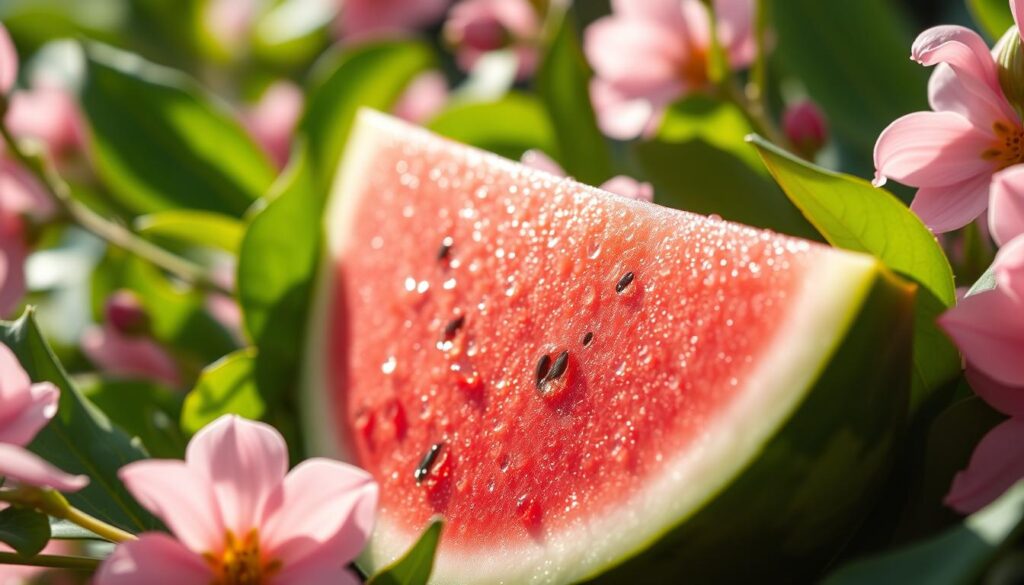
Your skin deserves the best, and watermelon can be a remarkable ally in maintaining optimal skin health. It’s packed with moisture and essential nutrients, making it great for your skin. With about 92% water, it acts as a natural moisturizer, keeping your skin hydrated and refreshed.
As you explore skin health and watermelon, you’ll discover its many benefits. It’s a great addition to your skincare routine.
How Watermelon Nourishes Your Skin
Watermelon’s vitamins and enzymes work together to deliver potent antioxidants for skin health. It’s rich in vitamins A, B, and C, which nourish and brighten your skin. These vitamins help in:
- Brightening your overall skin tone
- Reducing excess sebum production
- Promoting healthy collagen synthesis for elasticity
- Fading dark spots and preventing acne marks
Watermelon also has gentle exfoliating properties. Malic acid in it helps remove dead skin cells. This makes watermelon good for all skin types, including sensitive skin, ensuring a smooth and rejuvenated appearance.
Protective Properties Against Sun Damage
Watermelon has watermelon sun protection benefits. Lycopene, a powerful antioxidant in it, helps shield your skin from harmful UV rays. Its anti-inflammatory qualities can calm irritation and redness, promoting a more even skin tone. While watermelon offers some protection, using sunscreen is key for full sun protection.
In summary, adding watermelon to your skincare routine can make your skin glow. Look for skincare products with watermelon extract or watermelon seed oil to get the most benefits.
| Benefits of Watermelon for Skin | Description |
|---|---|
| Hydration | The high water content provides natural moisture. |
| Nourishment | Rich in vitamins A, B, and C for a radiant complexion. |
| Exfoliation | Helps remove dead skin cells for smoother skin. |
| Sun Protection | Lycopene provides some protective benefits against UV damage. |
| Anti-Inflammatory | Calms skin irritation, redness, and inflammation. |
The Role of Watermelon in Heart Health
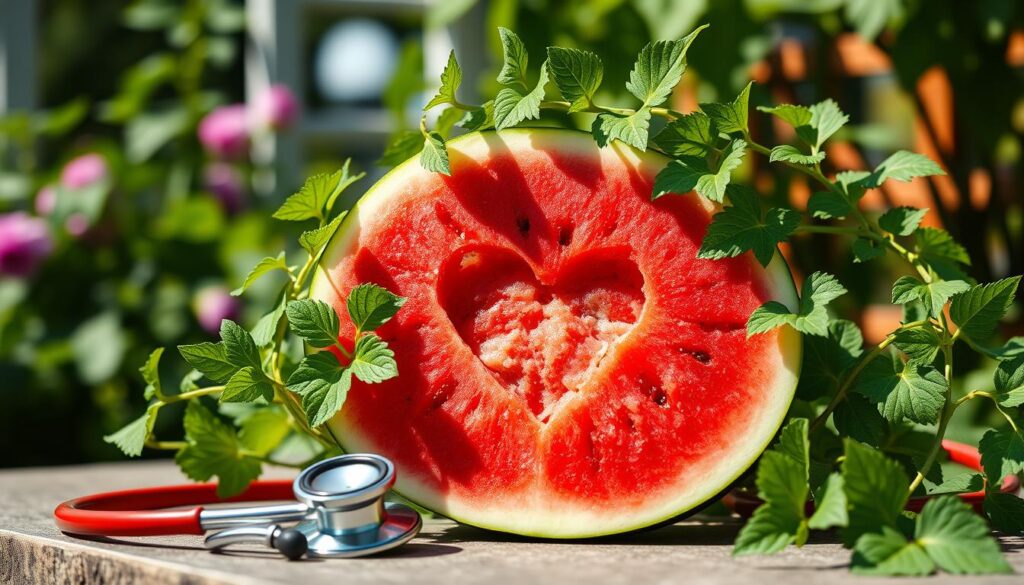
Watermelon is great for your heart. It’s full of fiber, potassium, and antioxidants. These help keep your heart healthy.
Studies show eating watermelon boosts nutrient intake. The National Health and Nutrition Examination Survey found people who ate watermelon got more fiber, magnesium, and vitamins. They also got more lycopene than those who didn’t.
Lycopene in watermelon helps lower cholesterol and blood pressure. A cup and a half of watermelon has 9 to 13 milligrams of lycopene. This is more than tomatoes. Lycopene is key for heart health, reducing heart disease risk.
Watermelon also has citrulline, an amino acid. It helps make nitric oxide, improving blood flow. This can lower blood pressure and prevent artery blockages.
| Nutritional Content (per 100 grams) | Calories | Water | Protein | Carbohydrates | Sugars | Fiber | Fat |
|---|---|---|---|---|---|---|---|
| Watermelon | 30 | 91% | 0.6g | 7.6g | 6.2g | 0.4g | 0.2g |
Watermelon has a low glycemic load of 4. This helps keep blood sugar stable. It also keeps insulin levels from spiking too high. Plus, it’s very hydrating, with 92% water content.
Eating watermelon as part of a healthy diet is good for your heart. It tastes great and is full of nutrients. Adding watermelon to your meals can improve your heart health.
Potential Anti-Cancer Properties
Watermelon is more than just a refreshing drink; it has anti-cancer properties too. It’s full of antioxidants that fight off harmful free radicals. These free radicals can cause diseases like cancer. Lycopene, a key antioxidant in watermelon, helps reduce inflammation and stress linked to cancer.
Watermelon also has cucurbitacin E, which can slow down cancer cell growth. This makes watermelon a great choice for anyone looking to prevent cancer. Eating watermelon regularly can boost your health and help prevent cancer.
Watermelon’s hydrating nature is also important for cancer patients. It’s 90% water, making it easy to stay hydrated. This is key for patients on restricted diets.
There are many tasty ways to add watermelon to your diet. Try Chili Lime Watermelon or Watermelon Feta Skewers. These recipes are quick and fun, and they highlight watermelon’s health benefits.
| Nutrient | Amount per 100g |
|---|---|
| Water | 90g |
| Lycopene | 4.5mg |
| Vitamin C | 8.1mg |
| L-Citrulline | 0.9 – 5mg |
| Calories | 30 |
While more research is needed, watermelon’s anti-cancer properties are promising. It’s a great addition to a healthy diet. Enjoy watermelon and its benefits for your well-being.
Health Risks and Considerations
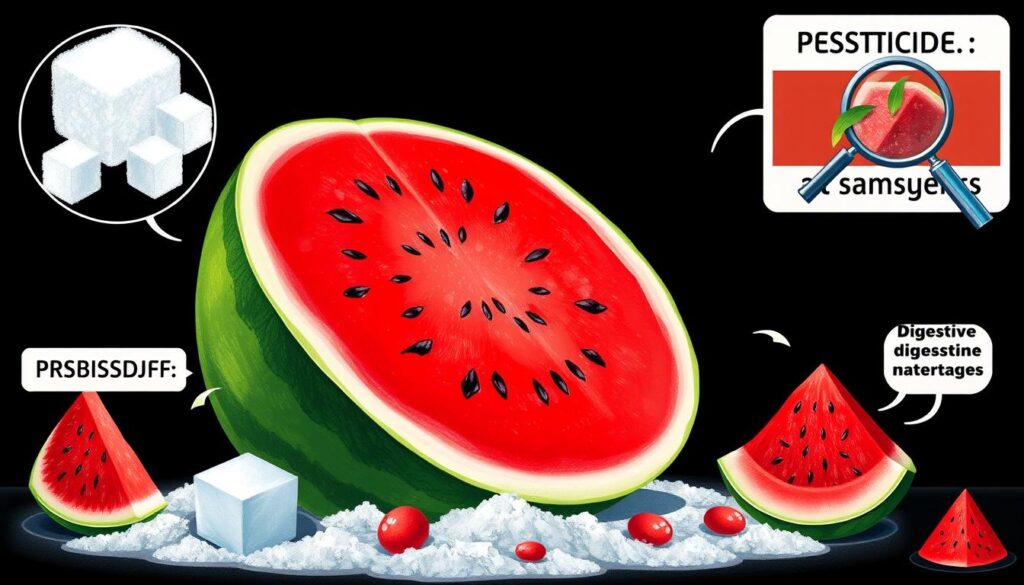
Watermelon is tasty and keeps you hydrated, but it has some health risks. It has a lot of sugar, about 36 grams in a serving. This can cause blood sugar spikes, which is bad for people with diabetes. It’s key to eat it in moderation to avoid these problems.
Watermelon is also a high FODMAP food. The fructose in it can upset your stomach, causing bloating, gas, or diarrhea. If you’re sensitive to FODMAPs, eat it in smaller amounts.
Watermelon is full of good stuff like lycopene, but too much can be bad. Eating more than 30 mg a day can cause nausea, diarrhea, indigestion, and bloating. These symptoms show why it’s important to not overdo it.
To manage these risks, check out this table. It shows watermelon’s carbs and sugar in different serving sizes and how they might affect blood sugar:
| Serving Size | Carbohydrates (grams) | Sugar (grams) | Glycemic Index |
|---|---|---|---|
| 1 cup (152g) | 12g | 9g | 72-80 |
| 2 cups (304g) | 24g | 18g | 72-80 |
| 4 cups (608g) | 46g | 36g | 72-80 |
Nutritionists say to limit watermelon to about 2 cups (300 grams) a day. This way, you can enjoy it without harming your health.
Conclusion
Watermelon is more than just a tasty and cool fruit. It’s also packed with nutrients that are great for your health. With over 90% water, it helps you stay hydrated, perfect for hot summer days. Plus, it’s low in calories, making it a good choice for those watching their weight.
Adding watermelon to your meals gives you important vitamins and minerals like Vitamin C and potassium. These help keep your heart and skin healthy. The antioxidants in watermelon, like lycopene, may even help lower cancer risks. So, watermelon’s benefits go way beyond its refreshing taste.
Knowing the health perks of watermelon helps you make better food choices. You can enjoy it as a snack, in smoothies, or in fruit salads. Watermelon makes your meals more exciting and boosts your health at the same time.

